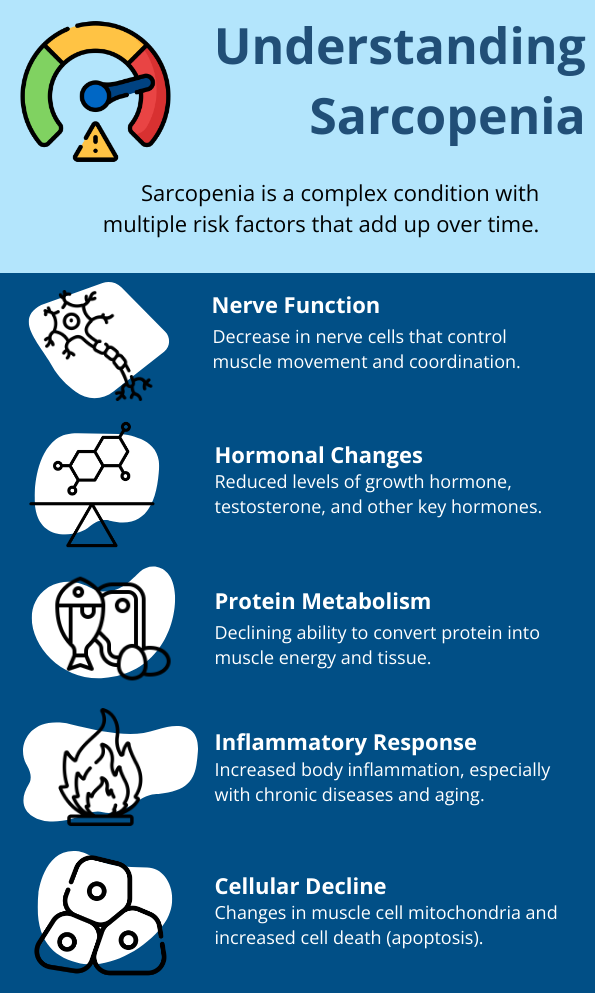The Hidden Power of Muscles
Giving your muscles the correct nutritional and physical stimuli will keep them strong. This knowledge is crucial for anyone seeking to maintain their independence, vitality, and overall well-being throughout life. But first we need to understand that its not just about muscle size and physical strength, your muscles do a whole lot more!
Muscles 101 - Everything You NEED to know!
Your muscles are obviously really important for moving, standing, and breathing. But they do a whole lot more! Muscles control how your body uses energy and protein. Think of your muscles like sensors and storage for important nutrients like glucose (for energy) and amino acids (the building blocks of protein). But, when muscle is being used up faster than it is being created there are some very dangerous consequences and complications.
When your body needs these critical nutrients, your muscles can release them. The progressive muscle loss that occurs with sarcopenia has serious consequences, affecting your recovery, immunity, and even increasing the risk of death. This is why it is so important to take proactive steps to protect your muscles and maintain your vitality for years to come.
What do muscles provide?
- Resources: muscles provide an emergency ‘overdraft’ of resources for the body.
- Control: Storing and releasing vital nutrients when needed ensures vital organ never go without.
- Reserves: When sick or injured muscles provide extra energy and protein to heal.
- Energy: Muscles make energy through movement and absorb glucose without insulin.
How Nerves and Muscles Work Together
Think of your nervous system and muscles as a complex communication network. Just like a phone need both a good signal and a working battery to function, your muscles need both strong nerve connections and healthy muscle tissue to work properly.
Your nerves and muscles meet at special connection points called neuromuscular junctions. These are like tiny communication centers where your brain’s messages are translated into muscle movement.
As we age, these vital connections can become weaker or break down.

When Connections Get Weak
This breakdown in communication between nerves and muscles is one of the hidden reasons why sarcopenia develops.
Fortunately, research has shown that maintaining these nerve-muscle connections is possible through activity, nutrition and targeted supplementation.
When these nerve-muscle connections weaken:
- Muscles may not respond as quickly to brain signals
- Movements become less precise and balance suffers
- Muscle strength decreases even if the muscle itself is healthy
Sarcopenia is not just about losing muscle – it’s about losing the vital connections that make those muscles work effectively.
Is Inflammation Stealing Your Strength?
Inflammation is a natural process that helps your body heal and fight off infection. Think of it like your body’s repair crew – when something needs fixing, inflammation helps direct the repair team to the right spot. Think of inflammation like a fire. A small, controlled fire can be helpful, but a fire that burns too long or gets out of control can cause significant damage.
The challenge comes from our modern world. Our bodies are constantly dealing with environmental toxins, processed foods, chronic stress, lack of sleep and a sedentary lifestye. These factors can create chronic (ongoing) inflammation that slowly damages your muscles.

Losing Muscle = Losing Energy
Losing muscle means losing both your energy and nutritional reserves. This is why sarcopenia is so dangerous. Sarcopenia is like your body’s “emergency fund” being depleted, leaving you vulnerable and unable to bounce back from challenges.
This loss of energy has a ripple effect throughout your entire system. It weakens your immune system’s ability to heal from illness or injury, slows down your metabolism, impairs your digestion, and can even lead to physical disability.
Ultimately, sarcopenia results in a poorer quality of life and potentially higher healthcare costs due to increased vulnerability to various health issues.
The loss of energy impacts all other systems in the body, from the immune system’s ability to heal after illness or injury, to reduced metabolism, impaired digestion, physical disability, and higher healthcare costs.
The Impact of Inflammation
When your body is constantly inflamed, it’s like having too many repair crews working at once – they start getting in each other’s way and might even cause damage instead of fixing it.
This persistent inflammation:
- Makes it harder to build new muscle
- Speeds up muscle breakdown
- Reduces muscle strength
- Interferes with recovery
- Accelerates aging
How Inflammation Affects Your Muscles

Rebuild Muscle Mass and Strength
Fortunately, there are evidence-based scientific strategies to maintain and even rebuild muscle mass and strength. With targeted nutrition, it is possible to prevent or even reverse the negative outcomes associated with muscle loss.
Keep Learning!
Advancing health through evidence-based nutrition since 2025™
The nutritional information on this site has been developed and reviewed by qualified medical professionals. However, while this content is based on current scientific evidence, it is for educational purposes only. Always consult with a healthcare provider experienced in nutritional medicine before making significant changes to your diet or supplementation regimen, as individual needs vary and may require personalized guidance.
